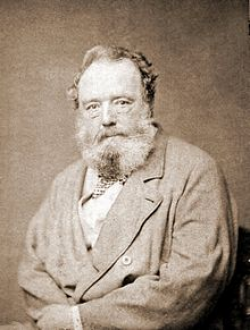Edwin Lankester

Edwin Lankester
- Born
- 23 April 1814
- Died
- 30 October 1874 (age 60)
Edwin Lankester was a public health reformer and naturalist who contributed to the control of cholera in London. He was the first public analyst in England.
Lankester was born to a poor family and his education came to an end at the age of 12. He was about to start an apprenticeship with a watchmaker in his home town of Woodbridge in Suffolk, when a local surgeon took him on as an articled pupil. Lankester worked as an assistant to surgeons who treated him poorly, before becoming an apprentice to Mr Spurgeon in Saffron Walden in Essex.
Spurgeon encouraged him to study Latin, Greek and the English classics. During his time in the town, Lankester was made secretary of the local natural history society and curator of the museum. His friends in the society lent him money so he could study medicine and the natural sciences, including zoology and botany, at the newly opened University College London.
Lankester still couldn’t afford the cost of the full course and qualified as MRCS and Licentiate of the Society of Apothecaries. After his marriage in 1845, he moved away from medicine to pursue the study of science and the extension of knowledge of scientific results.
During the cholera epidemic in London in 1854, he carried out studies of drinking water under microscopes and together with Dr John Snow, demonstrated how the Broad Street pump played a role. Examination by microscope is still a standard test of drinking water quality. Lankester helped Snow to prove his theory by persuading his vestry to set up a cholera committee which financed an epidemiological study and published the results.
Lankester was keen to spread knowledge about physiology and the causes of disease among the general public. He was appointed as the first medical officer for health in Westminster, a part time position he held until his death. He distributed leaflets to local households about how to prevent cholera, an approach that was continued by later health organisations. He appointed a sanitary inspector to carry out inspections of slum housing, and established a vaccination policy which halved the cases of smallpox in the parish.
In 1862 Lankester became the coroner for Central Middlesex. For 12 years his inquests featured in newspaper reports. His insistence on proper medical reports was condemned by the county financiers but approved of by the public. He used his position to draw attention to the issue of infanticide, baby farming and the neglect of workhouse infirmaries.



